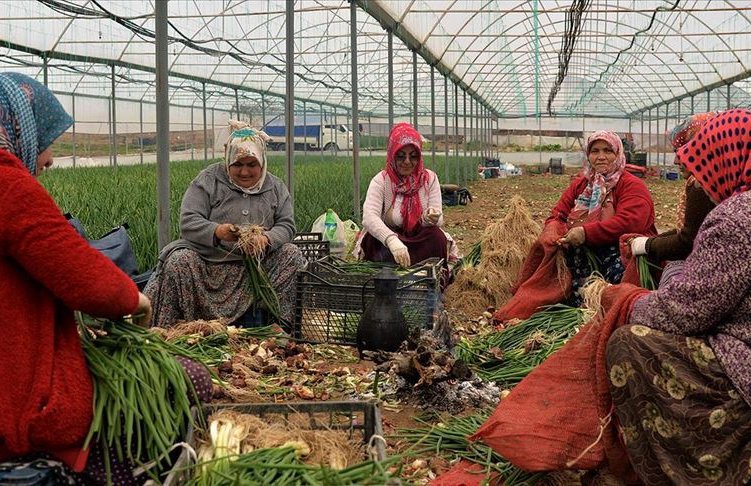Women workers in a greenhouse in Bilecik, northwest Türkiye. (Photo: AA/File)
Last week, October 15, marked International Day of Rural Women. Although Türkiye's agricultural industry saw its exports rise to an all-time high in 2021, with an increase of 20 percent to 29 billion US dollars, according to official data, women's position within this sector remains fragile.
Historically, agriculture has been Türkiye's primary employment sector and a significant contributor to the country's gross domestic product (GDP).
As no country except South Korea urbanized quicker since the 1960s, the sector's importance gradually decreased, leading to a decline in the number of farms and the shrinking and aging of the rural population.
Furthermore, Türkiye's agricultural production became increasingly linked with global markets. This marketization led to new models of agriculture, as farms started to focus on the specialization of intensive crops of fruit and vegetable production.
Market competition and price fluctuations left small-scale farmers vulnerable. The recent collapse of the lira and the surge in global commodity prices have increased this pressure on the farming industry.
For example, between March 2021-2022, fertilizer prices increased by 233 percent to 344 percent percent, diesel by 249 percent, and electricity used for irrigation by 103 percent.
This all resulted in agriculture's economic contribution dropping from 23 percent in 1980 to 8.3 percent in 2009 and about 5.82 percent in 2018. Employment in agriculture has declined over the years from 50 percent in 1980 to 19 percent in 2018.
Nonetheless, agriculture still plays a fundamental role in society and remains the second largest employment sector, with 5.5 million workers, employing almost one-fifth of the population.
It is the country's largest informal economy and the largest employment sector for women, with a women's employment rate of 41.5, according to Turkstat in July 2020.
Unpaid and informal work
Issues linked with informal work, such as the lack of social security, are prevalent in recent statistics, with 12 percent of the women working on daily wages.
Furthermore, 78.3 percent work as unpaid family workers and 95 percent of women work informally without social security. This is a significant difference compared to the overall informal women's working rate of 37.1 percent in 2020.
These issues were stressed last week, on the International Day of Rural Women, by Orhan Sarıbal, an MP of the main opposition Republican People's Party (CHP) and an agricultural engineer and a farmer.
''Today, 95 percent of the women working in agriculture have no social security at all. These women work in the fields for 16-17 hours, but they are outside the social security system.
"... Women who are insured, and registered with BAĞ-KUR [the social insurance institution for tradespeople, artisans and other independent employees], must pay 1,669 lira of monthly premiums. However, they do not have social security as most of them cannot pay such a high premium.''
Sarıbal further emphasizes that one out of every four women working in Türkiye is employed in agriculture, making them the backbone of agricultural production while facing massive oppression.
"Feminization" and refugee workers
That women make up a large part of agricultural work fits the trend of feminization of agrarian production, according to Saniye Dedeoğlu, associate professor at Muğla University, in her recent book "Syrian Refugees and Agriculture in Turkey Work, Precarity, Survival."
Women participate in agricultural work not as individuals but rather as an extension of their family or household. This is also visible in Türkiye's most recent addition to the agrarian labor force, Syrian women.
The rate of Syrian women working in agriculture is much higher than women's overall labor participation for both Syrian and Turkish women.
For example, according to UN data, the participation of women in the labor force in Syria was 13 percent in 2010, and 17 percent of Syrian women living in Türkiye in 2015. With around 3.7 million Syrians registered in the country, Türkiye is the largest-refugee hosting country in the world, and the agriculture sector, in particular, has become one of the major sectors hiring Syrian labor.
Dedeoğlu depicts how women are regarded as ideal workers not only due to their work ethic and "God-given" talent in agricultural work but also because of the ability of control that can be imposed on their labor and income.
Many Syrian women work under harsh conditions, such as extreme weather conditions and long working hours, with working days lasting 12 hours. Therefore, often exceeding the legal weekly forty-eight-hour working limit.
Besides these long working hours, the women are often also responsible for domestic tasks such as childcare. Thus, facing a double burden of both working in agricultural production and having domestic responsibilities.
Despite Türkiye's export of agricultural products boom might be good for business, women's position in this historically significant industry remains frail. (WM/VK)


